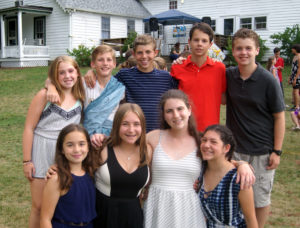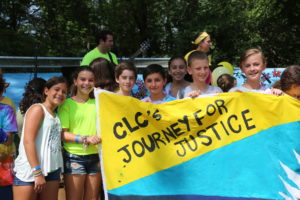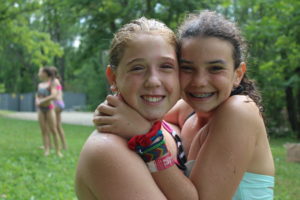The word “Shoftim” is well known to Crane Lake campers as they sing to Fight Song and Maccabiah judges during our special events at camp. This week’s parasha is also called Shoftim, and holds a wealth of meaning that can be applied to camp. Maya and Madison K., long time Crane Lake campers, shared these beautiful words with their temple community this Shabbat evening. We hope you enjoy as well!
Maya:
This week’s Torah portion is Shoftim, judges. In this parshah Moses and the Jews are about to enter the Promised Land. Moses commands that the people of Israel appoint judges and law enforcement officers to each city. He does this to ensure that justice is pursued all throughout Israel. Moses wants to make sure that the Jewish people treat each other and those around them fairly and that anyone accused of committing a crime is not punished due to favoritism or bias within the justice system. For example, Moses says that every crime and the associated evidence must be investigated very carefully, and there must be two laudable witnesses in the case of a capital crime in order for punishment to be administered.

In the third verse of the parshah, Moses offers one of most famous and often cited quotes from the Torah: “Tzedek, tzedek, tirdof,” which translates to, “Justice, justice you shall pursue.” The definition of justice that Moses is imparting to the Jews is all about equality and fairness in the eyes of the law. In this way, Moses establishes some of the basic principles of the Jewish justice system that are also followed today in Israel and most of the western world: Justice means that is given equal respect and treated the same way under the law.
So what does tzedek have to do with camp, and Crane Lake Camp in particular? I’ll tell you. This next summer will be my seventh at Crane Lake. A lot of summers, right? One question I’m frequently asked is, why do you keep going back? Why do you spend your whole summer there? Sure, I could do soccer or go swimming at any other camp. But what I know after all these years is that it’s now what we do at camp, but how it feels there that makes it special. I can honestly say that there is no environment like the one at Crane Lake. Everyone is accepting of one another in a way that’s hard to imagine if you haven’t been there. No matter the way you look, talk, or pray, every camper treats others with love and shows you the respect you deserve. Just like Moses commanded the Jews to treat each other fairly, at Crane Lake, we are always looking out for one another.
Last year we had a new camper in our bunk. On Opening Day when everyone was reuniting with old friends, she probably felt a little alone and maybe a bit out of place, but it wasn’t for long. Once everyone was unpacked and settled in, my friends and I went up to her and just started talking to her and including her in our fun because we knew that if we favored the friends we had known for longer over her, it wouldn’t be just or fair. It wouldn’t be the Crane Lake way. Instead of just talking to the friends we already had, we decided to make a new friend, and in so doing, help her see how amazing it is to step into the Crane Lake bubble and feel included and respected at all times.

At Crane Lake our passion for justice also extends outside of the camp community. Two summers ago my unit led a walk for Black Lives Matter. Following the principles that Moses lays out in Shoftim, we wanted to demonstrate how much we believe that all races should be treated with respect and dealt with fairly under the law. We made posters and wrote speeches all because of the great passion for tzedek that we’re taught at camp.
At Crane Lake we try very hard to follow what Moses wanted the people of Israel to do as they entered the Promised Land. And that’s why I continue going back to Crane Lake: Because I know it’s a safe and peaceful place where all of us treat each other justly and fairly and can feel safe and happy.
Maya is a 7th grade student at Brooklyn Heights Synagogue Religious School and this past summer was a Lower Chaverim camper.
Madison:
This week’s portion, Parshat Shoftim, takes place when Moses is leading the Jewish people into Israel. Moses is discussing important concepts of justice. Specifically, he says that Jewish people cannot attack another territory without attempting to seek peace first. In the sixth paragraph, he also mentions that no one can cut down fruit bearing trees because they have value. There are many interpretations of this paragraph, some of which suggest that the value of the fruit tree that Moses describes is a metaphor for the value of human beings. Some commentators have said that Moses is suggesting that we need to see the value in people, and that when we do, we will be disinclined to “cut them down”. In this way, Moses is establishing a core Jewish value that defines how we treat each other other and how we treat every human being.

At Crane Lake, the same value that Moses speaks of in Shoftim is central to the camp experience. How we treat one another is emphasized when we form our kehila kedosha, or holy community. At the beginning of both the first and second sessions, each bunk creates a brit, or a contract, that establishes the value of every person within the camp community. Much like the fruit bearing trees Moses speaks about in this week’s parsha, our brits reinforce the value of every bunk mate and the importance of the bond between each of us and to the entire camp.
Camp is a place where everyone gets to feel valued and has the opportunity to see how the fruit we bear contributes to the strength of the entire community. I felt it personally one year when I took a break from camp to attend an intensive acting program. I went up to camp on Visiting Day to see my sister and it was like I was coming home. I was reunited with the people and the places at camp that I love, and knew right then and there that I needed to come back.
Professor and author Brene Brown once said, “when you get to a place where you understand that love and belonging, your worthiness, is a birthright, not something you have to earn, anything is possible.” For me, and I think for most of us who have been there, that place is Crane Lake.
Madison has been attending Brooklyn Heights Synagogue since she was 3 years old. She was a student in the very first preschool class at BHS in 2003 and celebrated my bat mitzvah and was confirmed there as well. She also spent six amazing summers at Crane Lake Camp, and this past summer was a Machon (CIT).
